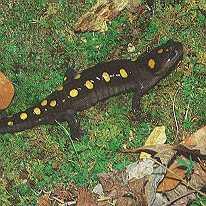Vernal Pools

Vernal pools are unique wildlife habitats best known for the amphField Guide to the Animals of Vernal Poolsibians and invertebrate animals that use them to breed. Vernal pools, also known as ephemeral pools, autumnal pools, and temporary woodland ponds, typically fill with water in the autumn or winter due to rising ground water and rainfall and remain ponded through the spring and into summer. Vernal pools dry completely by the middle or end of summer each year, or at least every few years. Occasional drying prevents fish from establishing permanent populations. Many amphibian and invertebrate species rely on breeding habitat that is free of fish predators. Find out much more about vernal pools and what is found in them in Massachusetts by ordering The Massachusetts Natural Heritage Field Guide to the Animals of Vernal Pools.
Some vernal pools are protected in Massachusetts under the Wetlands Protection Act regulations, as well as several other federal and state regulations, and local bylaws. The NHESP serves the important role of officially "certifying" vernal pools that are documented by citizens. Finding vernal pools is the first step for protection. The Massachusetts Aerial Photo Survey of Potential Vernal Pools has been produced by the NHESP to help locate likely vernal pools across the state. Learn about how vernal pools are protected, how to certify a vernal pool, and about the resources that are available from the NHESP and other organizations.
Vernal Pool Certification - Individuals who enter onto the property of another may be liable for civil and or criminal trespass. It is the sole responsibility of an individual providing vernal pool certification information to the Natural Heritage and Endangered Species Program to ensure that all of their activities associated with gathering said information comply with law.
The Natural Heritage & Endangered Species Program "certifies" the occurrence of vernal pools based on documentation of the pool's use by one or more groups of species that rely on vernal pools. This process relies on volunteers to identify vernal pools, and to collect and submit documentation. The Natural Heritage Program's "Guidelines for the Certification of Vernal Pool Habitat" describe the requirements for the documentation of biota using a vernal pool, and also has information on the maps that are required in order to obtain certification for a vernal pool. They also have general information regarding the physical characteristics of vernal pools, and some techniques for finding them. Gathering information for certification is an excellent way for people to learn about vernal pools and the animals that use them, and to become involved in the protection of natural resources in Massachusetts.
The Natural Heritage Program has certified about 4350 vernal pools as of January 2007. Click here to view a map and table of the number of certified vernal pools by town.
Official certification provides a vernal pool, and up to 100 feet beyond its boundary in some cases, certain protection under several state and federal laws. Originally defined and protected under the Massachusetts Wetlands Protection Act regulations, Certified Vernal Pools now also receive protection under Title 5 of the Massachusetts Environmental Code, Section 401 of the Federal Clean Water Act, the Massachusetts Surface Water Quality Standards which relate to Section 401, and the Massachusetts Forest Cutting Practices Act. These regulations help to eliminate direct impacts to certified vernal pools and to minimize indirect impacts. The Department of Environmental Protection (DEP) is responsible for the implementation of these regulations (except for the Forest Cutting Practices Act, administered by the Department of Conservation and Recreation), and has designated specific staff as vernal pool liaisons.
Contact the Department of Environmental Protection regarding the regulatory protection of certified vernal pools:
DEP Central Regional Office
Marielle Stone, Phil Nadeau
627 Main Street
Worcester, MA 01608
(508) 792-7650
For more information please click here.

